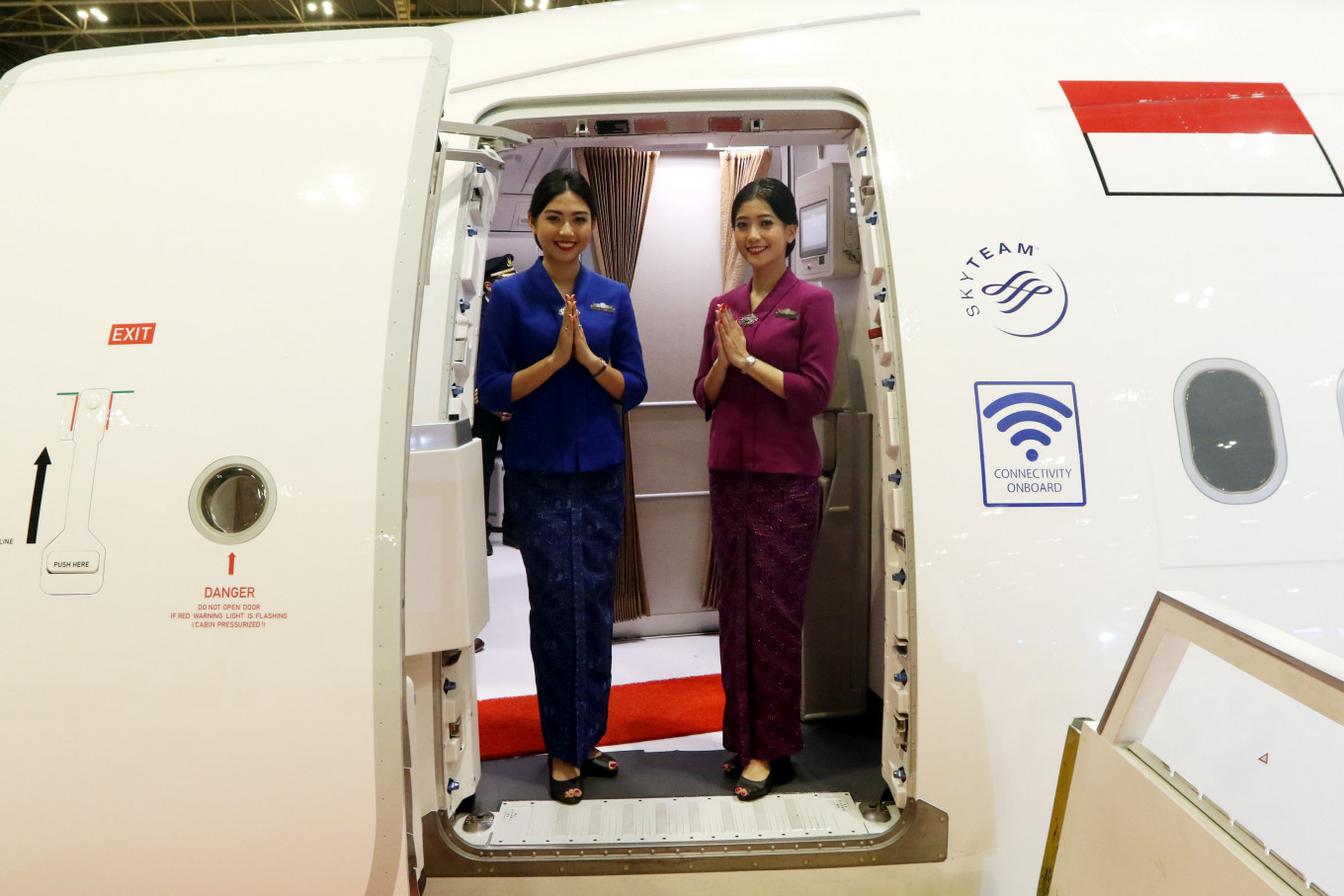Popular Reads
Top Results
Can't find what you're looking for?
View all search resultsPopular Reads
Top Results
Can't find what you're looking for?
View all search resultsGaruda turns in losses as pandemic hits aviation
Change text size
Gift Premium Articles
to Anyone
N
ational flag carrier Garuda Indonesia turned in a loss of US$712.73 million in the first half of this year after booking a net profit of $24.11 million in the same period last year as the COVID-19 pandemic continues to batter the airline industry.
Garuda president director Irfan Setiaputra said the COVID-19 pandemic forced the company to cut its flight frequency and such a measure had severely affected the company’s revenues and profits.
“The COVID-19 pandemic has had a severe impact on the company’s performance as our daily flight frequency has been reduced from around 400 to 100 flights. In addition, the number of passengers has also plummeted by around 90 percent,” he said in a statement on Saturday.
Garuda’s total revenue in this year’s first six months nosedived by 58.2 percent year on year (yoy) to $917.28 million, according to the company’s financial report submitted with the Indonesian Stock Exchange (IDX).
Scheduled flights remain the airline’s largest revenue source despite plunging by almost 60 percent annually to $750.26 million. Meanwhile, revenue from unscheduled or chartered flights soared by almost 400 percent yoy to $21.55 million in the first half.
Its operating expenses, at the same time, were down by 22 percent yoy to $1.6 billion in the same period.
“The company has taken strategic financial steps by renegotiating airplane leasing costs, loan restructuring and increasing cost efficiency to align between the supply and demand trends during the pandemic,” Irfan said.
The aviation industry is among the sectors hit the hardest during the pandemic as people are required to stay at home to help limit the coronavirus spread.
The Indonesian tourist sector has lost Rp 85 trillion (US$5.87 billion) in revenue so far this year as the pandemic unfolds. The hotel and restaurant industry has lost nearly Rp 70 trillion in revenue while aviation and tour operators have lost Rp 15 trillion in revenue as leisure travel has come to a virtual halt.
The government opened resort island Bali over the weekend as part of its efforts to prevent the economy and tourism from completely paralyzing. An estimated 4,000 passengers reportedly arrived at I Gusti Ngurah Rai International Airport on the first day of Bali's reopening to domestic tourists on Friday.
Jasa Utama Capital analyst Chris Apriliony projected on Monday that Garuda would post a better result in the third quarter compared with the second quarter as the number of flights would slightly increase despite remaining lower than normal.
“As the COVID-19 vaccine is still under clinical trials, the public remains reluctant to take unnecessary trips using airplanes,” he said.
To keep the carrier afloat, the House of Representatives in mid-July gave the green light for the government to provide Garuda with Rp 8.5 trillion through a mandatory convertible bond (MCB) scheme.
The MCB will require conversion of the said bonds into stock in the company in accordance with the contractual conversion date.
The MCB for the airline is expected to have a tenure of three years, with state-owned infrastructure financing company PT Sarana Multi Infrastruktur (SMI) acting as the bond buyer and eventually becoming a shareholder in the company.
The MCB scheme is part of the government’s national economic recovery (PEN) program to support the recovery of the virus-wracked economy. Under Government Regulation No. 23/3030 on the program, the government has allocated more than Rp 152 trillion to bail out state-owned enterprises (SOEs), including Garuda, through capital injections, among other mechanisms.
However, seeing the massive amount of losses booked during the first half, Chris expected that the MCB would not have a significant impact on the carrier.
“The government’s injection will not provide a significant impact if the company’s revenue continues decreasing in the future,” he said.
Garuda also recorded a significant amount of provision for bad debt expenses amounting to $63.96 million during the first half, which affected the company’s overall performance, Chris said.
“While the provision for bad debt expense isn’t really large compared with the overall costs, it has become an additional burden for the company,” he added.
Shares in Garuda, traded on the IDX with the code GIAA, increased by 2.59 percent on Tuesday closing at Rp 238 apiece as the main gauge, the Jakarta Composite Index (JCI), gained by 1.37 percent. The stock has lost 53.41 percent of its value so far this year.










